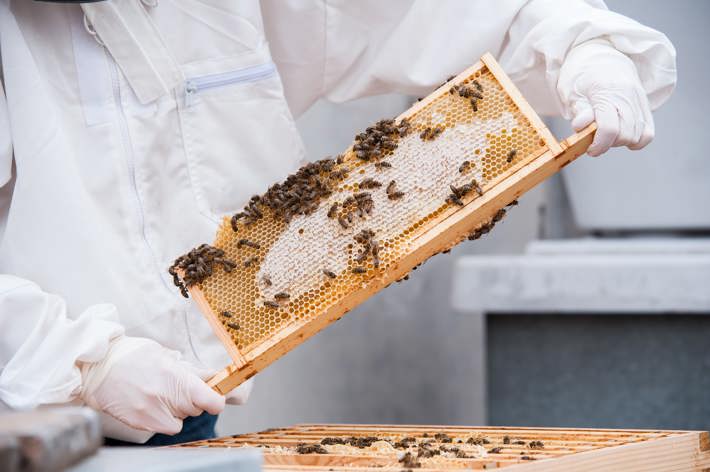
The Bloomsbury bees: meet beekeeper Paul Walton
Learn all about The Montague's very own honey bees with beekeeping expert Paul Walton.
01 Apr 2020
Learn all about The Montague's very own honey bees with beekeeping expert Paul Walton.
01 Apr 2020
The leafy enclave of Montague Street Gardens is currently abuzz with activity, thanks to the Bloomsbury Bees, a joint venture between Bedford Estates and The Montague on the Gardens. The installed hives are home to a swarm of over 20,000 and originate from the Dowager Duchess of Bedford’s estate in Woburn. The bees provide the fragrant local honey served at the hotel, and also play an important role in supporting the surrounding ecosystem. Here, we talk to beekeeper Paul Walton, whose hefty 30 years of experience have more than qualified him to introduce bees to Bloomsbury.
'You might say that I was destined to become a beekeeper. One of my uncles worked in farming and had beehives at the bottom of his garden. As I child I had complete freedom to roam around the farm but the bees were off-limits. It wasn’t until my early 30s that I bought my own bees. I kept them in my garden and, like most beginners, couldn’t leave them alone. I opened the colony every few days, just to see what they were doing. They survived in spite of my over-attentive nature but, my neighbours objected to living in such close proximity to thousands of buzzing insects. I found them a new home in an old orchard. I’m sure there must have been a collective sigh of relief from the bees as I would not be able to disturb them so frequently!'
'I have kept bees on the farms belonging to the Duke of Bedfordshire’s estate for many years. I also tend the hives in the Dowager Duchess’ private garden. This led to a request to teach a small team from the Bloomsbury estate office to become beekeepers. I taught them the basics before inviting them for a practical day among my own hives on the Duke’s estate. Simultaneously, an area was selected in the garden behind the office on Montague Street that would be most suitable to house two beehives. This was paved and planted by the gardeners and prepared for the arrival of the bees, which were brought down to London from Lady Tavistock’s own hives.'

'In my opinion, the temperament of the colony, which stems from the queen as they are all her offspring, is the main consideration. Even more so than the amount of honey they produce. That is because most other animals can be contained. Bees can’t. They may forage up to three miles from their hive and it is likely they will encounter animals or people. It is our responsibility as beekeepers to ensure that our stock is not aggressive.'
'When bees forage for food, they visit many thousands of flowers all within a three-mile radius of their hive. Some of these flowers are so small that humans scarcely even notice their presence. So, the diet of the honeybee (nectar and pollen) is incredibly varied – something than can be absent from our own diet. These pollen grains are extracted from the comb along with the honey and you can often tell what flowers the bees foraged on by analysing the pollen grains under a microscope. These pollen grains are particularly valuable to people with allergies as they can consume small quantities of the allergen all year round, thus, reducing the allergic reaction when the plant is in flower.
'Another benefit, which is often overlooked, is that by buying local honey, you are supporting your local beekeeper. Their bees will, in turn, pollinate the flowers in your garden. Many farmers are realising this now and planting 5m borders of wildflowers around their crops. These support all pollinators, not just honeybees.'
'Beekeepers will usually collect a honey harvest from the hives at the end of summer/early autumn. So, these carbohydrates need to be replaced if the colony is to survive the long winter months. Honeybees are active during the winter – they don’t hibernate.
The beekeeper will first reduce the entrance of the hive, so that other insects (for example, wasps) won’t be able to invade the hive and steal the colonies’ food. They will usually feed the bees a sugar syrup, which acts as a substitute for the honey harvest taken by the beekeeper.
The sugar syrup ensures the colony has a continual supply of carbohydrates, so the queen can continue to lay eggs longer into the autumn. This ensures that the colony has enough young bees to keep the queen warm over winter and support the colony as it expands in the spring.'
'City spaces can appear to be sterile and lifeless places without bees. There are many parks and gardens, each with their own mix of flora. Even trees and shrubs flower and can provide a food source to a range of insect pollinators.
Honeybees are incredibly good pollinators and, once a plant is pollinated, it produces seeds, which birds feed on. Ecosystems begin with simple things like creating, and maintaining, a food source. Before you know it, all sorts of birds and animals come in to feed on it. Cities don’t have to be sterile. They can be a home to lots of creatures as well as man.'
Get up close with the bees in The Montague's beekeeping experience.
Discover more